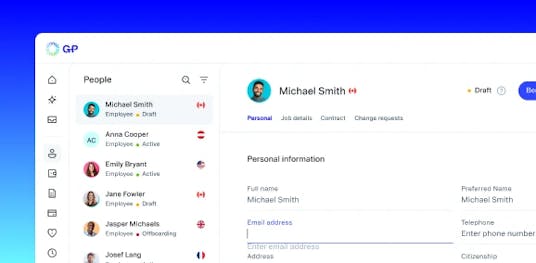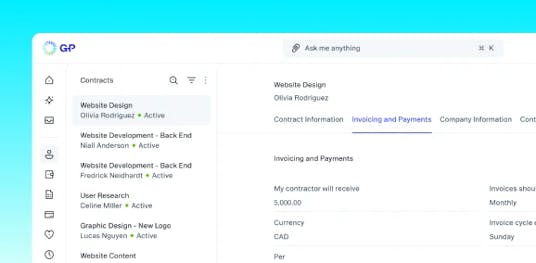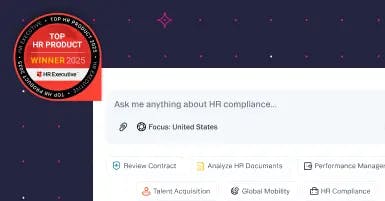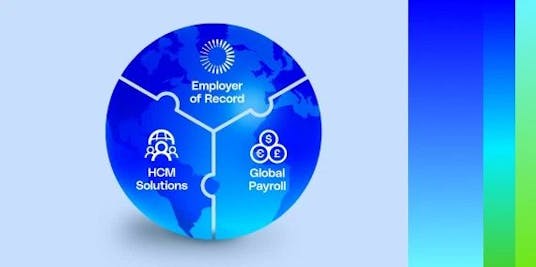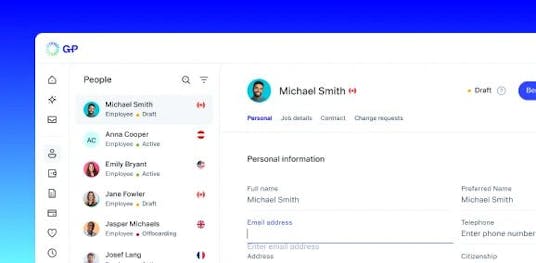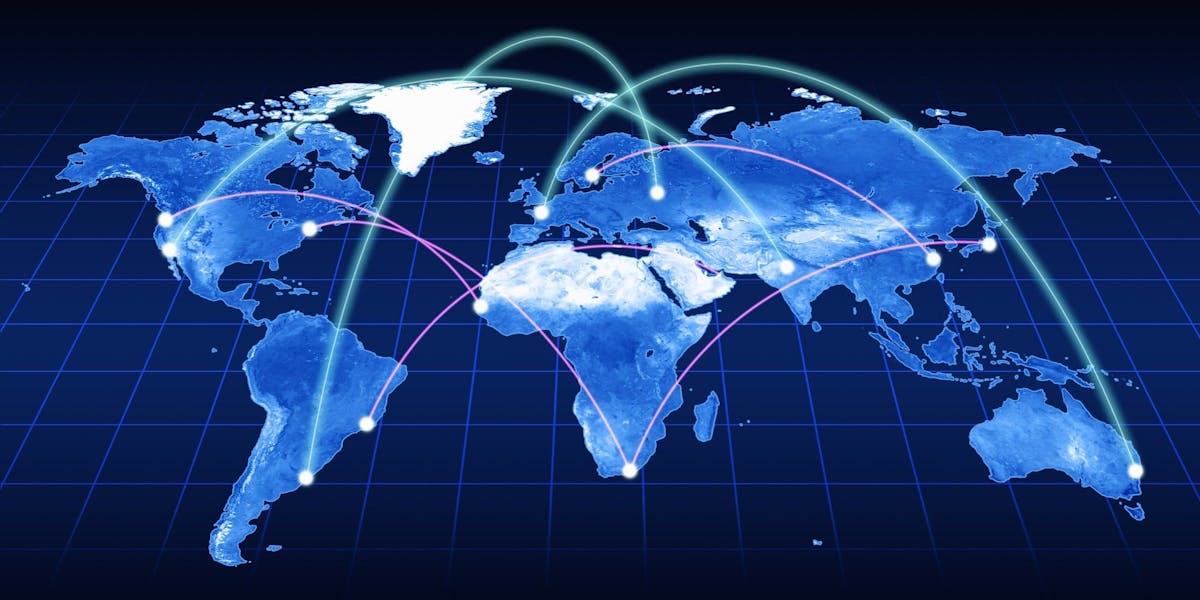Companies hire across borders to access skilled workers and enter new markets. Having clear goals and smart risk planning make it easier to find the best country to expand your business.
Employer of record (EOR) solutions support expanding your business to another country by simplifying international hiring. An EOR handles payroll, benefits, and compliance. You don't need to set up a local entity or navigate country-specific employment rules when you partner with an EOR. This reduces costs, speeds up hiring, and minimizes legal exposure. With the right EOR, you can build teams in top global markets faster.
Why businesses are expanding globally
Employment trends show a demand for flexible work and cross-border teams. A global workforce allows you to enter new markets, increase brand exposure, find new investment opportunities, and gain access to a larger talent pool.
Before hiring in a new country, you should research the legal framework. Compliance mistakes can cause fines, delays, or reputational damage. An EOR simplifies cross-border hiring and handles all legal matters, so you can expand anywhere with confidence.

The top 10 best countries to expand your business to
The best countries to expand your business internationally offer a mix of skilled talent, business-friendly regulations, and manageable operating costs.
1. Mexico
Mexico offers cost-effective talent and proximity to the U.S., making it ideal for companies looking to tap into North American markets. This country has a 30% corporate tax rate and a stable economy. Labor laws are clear, and trade agreements support cross-border business. More key advantages include:
-
Strong manufacturing and logistics sectors
-
Access to the United States-Mexico-Canada Agreement (USMCA) trade benefits
-
Simplified tax and labor compliance with EOR support
-
Bilingual talent in key business regions
2. Canada
Canada is a business-friendly country with a strong legal system and diverse talent base. It offers a 15% federal corporate tax rate and stable economic growth. Other benefits include:
-
High levels of education and a skilled workforce
-
Transparent regulatory environment
-
Strong intellectual property (IP) protections
-
Favorable immigration policies
-
Thriving ICT, engineering, oil, and gas sectors
3. India
India is a top destination for tech and service-based roles. It's the world's fourth-largest economy and has up to a 35% corporate tax rate. The talent pool is large, and many individuals speak English. This country also offers:
-
The world's largest population of science, technology, engineering, and math (STEM) graduates
-
An established outsourcing infrastructure
-
Cost-effective labor costs
-
A central time zone for Asia-Pacific (APAC) markets
-
An increasing investment in digital infrastructure
4. Philippines
The Philippines is ideal for customer service, support, and back-office roles. The corporate tax rate is 25%, and the workforce is fluent in English and familiar with global business norms. Other advantages include:
-
Strong business process outsourcing (BPO) industry
-
Cost-effective salaries
-
Multilingual workforce
-
Expanding IT sector
5. China
China offers access to one of the largest consumer markets and advanced manufacturing capabilities. Manufacturing costs are low, and the standard corporate tax rate is 25%. China is a strategic base for APAC operations with these added benefits:
-
Advanced industrial and tech sectors
-
Access to a massive domestic market
-
Government incentives for global investment
-
Skilled engineering and production talent

6. Ireland
Ireland is a key entry point to the European Union and a tech hub for multinationals. The corporate tax rate is one of the lowest in the EU at 12.5%. Popular industries in the country include financial services, agriculture, export, trade, and technology.
Key benefits include:
-
Skilled tech and finance professionals
-
Strong data protection compliance
-
Business-friendly policies
7. Singapore
Singapore's strategic location, regulatory clarity, and talent quality make it an ideal expansion destination in Asia. The country has a corporate tax rate of 17% and an overall favorable tax code. More advantages of this country include:
-
Fast business entity setup
-
Competitive corporate tax rates
-
Highly educated, multilingual workforce
-
Strategic location for APAC expansion
-
Pro-business legal framework
8. Japan
Japan offers access to a high-tech, high-value economy with a bracketed corporate tax rate between 15–23.2%. Japan is the world’s fifth-largest economy, after the U.S., China, Germany, and India. It offers these benefits:
-
Strong IP and contract enforcement
-
Skilled workforce in robotics, engineering, and tech
-
High consumer purchasing power
-
Established infrastructure and corporate culture
9. U.K.
The U.K. is a strong base for global companies. The corporate tax rate is 25% for most companies. As the second-largest economy in Europe, it provides access to global markets and these key advantages:
-
Strong services economy
-
Flexible labor market with clear employment laws
-
Streamlined company registration
-
Highly skilled legal and finance professionals
10. Brazil
Brazil is the largest economy in South America with strong potential in agriculture, energy, and fintech. Although the 34% corporate tax rate is high, Brazil offers business growth potential and these key benefits:
-
Dynamic and multilingual workforce
-
Large domestic consumer market
-
Skilled talent in IT and finance
-
Clear legal framework
-
Government incentives for tech investment
Expansion priorities for finance, HR, legal, and executives
Finance, HR, legal, and executive teams should collaborate to balance opportunity with risk. Your approach should be targeted and well-informed.
Finance: Control costs and forecast accurately
Finance leaders have to justify costs and prove return on investment. They must assess new markets' full financial impact, from taxes and employment costs to currency risk. They do this by:
-
Comparing labor costs, tax rates, and social contributions across countries
-
Evaluating the total cost of hiring — including the base salary — and regulatory benefits
-
Factoring in currency volatility and repatriation restrictions
-
Partnering with an EOR for cost-effective global hiring
-
Using AI technology for cost tracking and forecasting
Mexico, India, and the Philippines offer affordable labor costs, but these countries have complex compliance obligations.
HR: Build a compliant and competitive workforce
HR leaders must understand how to attract and retain talent in each market. This means aligning hiring practices and benefits to local expectations while maintaining global standards. Their focus areas include:
-
Designing competitive compensation that aligns with market norms
-
Partnering with an EOR to manage payroll, onboarding, and compliance
-
Using a global employment platform that supports multicountry HR management
-
Adapting policies for cultural relevance and employee engagement
Ireland, Canada, and Singapore offer skilled talent and strong infrastructures. However, these countries may have higher employment costs and tight labor competition.
Legal: Ensure global compliance and reduce risk
Hiring in another country means following unique employment, tax, and data protection laws. Legal professionals focus on:
-
Monitoring permanent establishment risks and corporate liabilities
-
Maintaining compliance with global data protection laws, such as the EU's General Data Protection Regulation (GDPR)
-
Reviewing IP, confidentiality, and compliance regulations
-
Vetting third-party vendors, including EOR providers, for compliance guarantees
China, Brazil, and Japan have strong economies, but your legal team must stay proactive to avoid costly violations or legal challenges.
Executives: Align strategy and lead the change
Executives need a market that supports the company's long-term goals and offers cross-border growth without disruption. Key focus areas for executives include:
-
Matching plans with business models, demand, and customer reach
-
Evaluating ease of market entry, political stability, and trade relationships
-
Promoting cultural awareness and inclusion to support global teams
The U.K., Japan, and Canada offer regulatory stability and high-value economies, making them strong options for strategic regional hubs.

How to choose a country to expand business
The country you choose should align with your business goals and operational capacity. Here's how to choose the right market:
Step 1: Know why you're expanding your business to other countries, what outcomes you expect, and how you'll measure success.
Confirm that the market supports your broader business strategy.
Step 2: Assess market potential and demand.
Market size, demand for your products, and competitive landscape will influence long-term success. Evaluate projected cost versus revenue. The market must be financially sustainable and strategically aligned with your long-term goals.
Step 3: Evaluate workforce availability.
Study the talent pool and skills supply.
Step 4: Review employment and labor laws.
Misclassifying workers or failing to meet local standards can lead to penalties or reputational damage. Verify that your employment structure complies with local law and ensure compliance with onboarding, benefits, and workplace policies.
Step 5: Analyze tax and regulatory needs.
Assess tax exposure and total compliance costs. Evaluate the risks tied to business registration and ongoing operations.
Step 6: Look at the country's ease of operation and infrastructure support.
Poor infrastructure or unreliable digital access can disrupt work. Confirm that the local environment supports remote work, secure data access, and dependable service delivery.
Step 7: Evaluate cultural and legal risk.
Cultural misalignment can cause team friction and hinder local adoption. Legal or political instability also increases risk. Support cultural integration by training managers and teams to work effectively across cultures.
Step 8: Choose a market entry strategy.
Using an EOR offers cost effectiveness, assured compliance, and flexibility, as you don't need a local entity. It speeds up hiring and lowers risk.
Step 9: Use digital tools to manage your workforce.
Global employment platforms streamline HR, finance, and legal processes globally. This supports consistency and improves transparency across all departments. SaaS tools are no longer optional. They allow real-time payroll, time tracking, compliance, and reporting management across global teams. Human resource information systems (HRIS), EOR platforms, and workforce analytics tools help coordinate work across time zones and borders.
Expand globally with G-P EOR
Choosing the best country to expand globally is a balance of financial, legal, operational, and cultural factors. Cross-functional collaboration ensures that expansion is compliant, cost-effective, sustainable, and scalable.
As the recognized leader in global employment, G-P™ helps companies of all sizes hire, onboard, and manage global teams in 180+ countries without the need to establish new entities. Our industry-leading global employment products and EOR solutions are backed by the largest team of in-country HR, legal, and compliance experts to streamline and simplify the entire global employment lifecycle.
